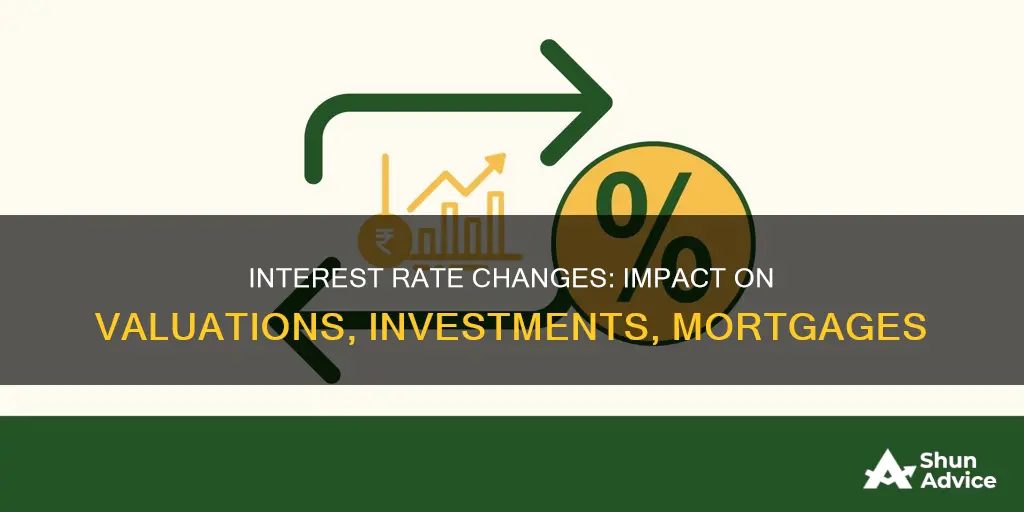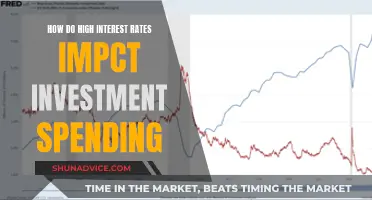
Changes in interest rates can have a significant impact on investments, mortgages, and the stock market. Rising interest rates can put pressure on stock valuations, as investors may choose to invest in bonds that offer more attractive yields. This can result in reduced company profits, which may be reflected in lower stock prices. Additionally, rising interest rates can lead to higher mortgage rates, which can cool the real estate market. On the other hand, some sectors, such as the financial industry, may benefit from interest rate hikes as they can charge more for lending. Understanding the impact of interest rate changes is crucial for investors to make informed decisions and manage their portfolios effectively.
| Characteristics | Values |
|---|---|
| How interest rates affect stock markets | Rising interest rates can challenge equities as investors may choose to invest in bonds that pay more attractive yields than stocks. Higher rates can put pressure on stock valuations as corporations may need to generate more attractive earnings to capture investor interest. |
| Rising interest rates can also reduce company profits, which can be reflected in lower stock prices. | |
| However, the financial industry tends to benefit from interest rate hikes as they can charge more for lending. | |
| How interest rates affect the real estate sector | Rising interest rates mean higher mortgage rates, which tends to cool the real estate market. |
| How interest rates affect your investments | Rising interest rates mean you receive higher interest on the money in your savings account. |
| However, your mortgage rate could go up, your car loan could be more expensive, and your stock portfolio could dip. |
What You'll Learn

How interest rates affect stock markets
Interest rates can affect stock markets in different ways. When rates rise, investors may choose to invest in bonds that offer more attractive yields than stocks. This can put pressure on stock valuations, as corporations may need to generate more attractive earnings to capture investor interest. Higher interest rates can also impact companies' bottom lines, as debt-issuing companies may face higher borrowing costs, resulting in reduced profits and lower stock prices.
The financial industry, including banks, brokerages, mortgage companies, and insurance companies, tends to benefit from interest rate hikes. These companies can charge more for lending, increasing their earnings. Investors should also consider real interest rates, which account for inflation. Real rates could be negative if inflation is rising faster, potentially supporting higher asset valuations even if nominal rates are rising.
The impact of interest rates on stock valuations is often more pronounced for growth stocks that derive more of their value from expected future earnings. Rising interest rates can also affect the real estate sector, as higher mortgage rates tend to cool the market.
Overall, changes in interest rates can have complex and varied effects on stock markets, and investors need to pay attention to these changes to make informed decisions about their portfolios.
Invest Wisely: Harnessing the Power of Compound Interest
You may want to see also

How interest rates affect the real estate sector
Interest rates can have a significant impact on the real estate sector. When interest rates rise, mortgage rates tend to increase, which can make buying a property less affordable for many people. This can lead to a cooling of the real estate market, as potential buyers may choose to delay their purchase or opt for renting instead. Higher interest rates can also put pressure on property valuations, as investors may demand higher yields to compensate for the increased cost of borrowing.
On the other hand, falling interest rates can stimulate the real estate market by making mortgages more affordable. Lower rates may encourage more people to buy properties, leading to increased demand and potentially higher property prices. Additionally, lower interest rates can make it more attractive for investors to borrow money to fund their purchases, further driving up demand.
The impact of interest rates on the real estate sector is not always straightforward, as other factors can also come into play. For example, economic conditions and inflation can influence central banks' decisions to adjust interest rates, which in turn can affect the attractiveness of real estate as an investment option.
It is also worth noting that the financial industry, including banks, brokerages, mortgage companies, and insurance companies, tends to benefit from rising interest rates. This is because they can charge more for lending, leading to increased earnings.
Interest: Friend or Foe to Your Investment Earnings?
You may want to see also

How interest rates affect the financial industry
Interest rates can have a significant impact on the financial industry, affecting everything from stock markets to mortgage rates. When interest rates rise, investors may choose to invest in bonds rather than stocks, as bonds can offer more attractive yields. This can put pressure on stock valuations, as companies may need to generate more attractive earnings to capture investor interest.
Rising interest rates can also impact mortgage rates, which tend to rise as a result. This can cool the real estate market, as higher mortgage rates may deter potential buyers. However, the financial industry, including banks, brokerages, mortgage companies, and insurance companies, can benefit from higher interest rates as they can charge more for lending.
The impact of interest rates on stock valuations is often more pronounced for growth stocks, which derive more of their value from expected future earnings. If a company issuing debt faces higher borrowing costs due to rising rates, it may result in reduced profits, reflected in lower stock prices.
Additionally, investors should be aware of real interest rates, which account for inflation. Real rates could be negative if inflation is rising faster, potentially supporting higher asset valuations even if nominal rates are increasing.
Deducting Investment Interest: Schedule A Expenses Explained
You may want to see also

How interest rates affect your savings account
Interest rates can have a significant impact on your savings account. When interest rates rise, you will receive higher interest on the money in your savings account. This means that your savings will grow faster. However, it is important to note that rising interest rates can also affect your mortgage rate, car loan, and stock portfolio.
When interest rates are low, it is generally a good time to borrow money. This is because the cost of borrowing is lower, and you will pay less interest over the life of the loan. On the other hand, when interest rates are high, it is generally a good time to save money. This is because you will earn more interest on your savings.
It is important to pay attention to changes in interest rates, especially if you have a variable-rate mortgage or other variable-rate loans. When interest rates rise, your monthly payments on these loans may increase. This can affect your budget and financial planning.
Additionally, interest rates can impact the stock market. Rising interest rates can put pressure on stock valuations as investors may choose to invest in bonds that offer more attractive yields. This can result in reduced company profits and lower stock prices. However, some sectors, such as the financial industry, tend to benefit from rising interest rates as they can charge more for lending.
Overall, changes in interest rates can have both positive and negative effects on your savings account. It is important to stay informed and adjust your financial strategies accordingly.
Mortgage Interest Rates: Higher for Investments?
You may want to see also

How interest rates affect mortgage rates
Interest rates can have a significant impact on mortgage rates. When interest rates rise, mortgage rates tend to increase as well. This is because the cost of borrowing money becomes more expensive, and lenders pass these higher costs on to borrowers in the form of higher mortgage rates.
The impact of rising interest rates on mortgage rates can be particularly noticeable in the real estate sector. Higher mortgage rates can make it more difficult for potential homebuyers to qualify for a loan, leading to a decrease in demand for properties. As a result, the real estate market may cool down, with property prices potentially declining.
On the other hand, when interest rates fall, mortgage rates may also decrease. Lower interest rates can make borrowing money more affordable, encouraging more people to take out mortgages and stimulating the real estate market. Lower mortgage rates can lead to increased demand for properties, potentially driving up property prices.
It's important to note that the relationship between interest rates and mortgage rates is complex and can be influenced by various factors, including the overall health of the economy, inflation rates, and central bank policies. Additionally, the impact of interest rate changes on mortgage rates may vary depending on the specific circumstances and market conditions at the time.
Overall, changes in interest rates can have a significant impact on mortgage rates, which in turn can affect the real estate market and property prices. It is crucial for homebuyers, homeowners, and investors to stay informed about interest rate movements and their potential implications for mortgage rates.
Compound Interest: The Investment Snowball Effect
You may want to see also
Frequently asked questions
Rising interest rates can put pressure on stock valuations, as investors may choose to invest in bonds that offer more attractive yields than stocks. This can result in reduced company profits, which can be reflected in lower stock prices.
Banks, brokerages, mortgage companies, and insurance companies' earnings often increase as interest rates rise because they can charge more for lending.
Rising interest rates can lead to higher mortgage rates, which tends to cool the real estate market.
Rising interest rates mean you will receive higher interest on your savings account. However, it can also make your mortgage and loan payments more expensive and negatively impact your stock portfolio.
Bad news and uncertainty in the world are generally good for mortgage interest rates, as investors tend to flock to bonds, pushing interest rates lower.







